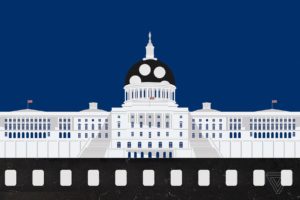Congress is trying to give even more power to Hollywood
 [Philip Lelyveld comment: inflamatory headline. The bill may give more power to one group, but it is still trying to control things that are technologically beyond control.]
[Philip Lelyveld comment: inflamatory headline. The bill may give more power to one group, but it is still trying to control things that are technologically beyond control.]
On March 23rd, Reps. Bob Goodlatte and John Conyers introduced a controversial bipartisan bill with over 100 years of history behind it, though you wouldn’t know it from its boring name and seemingly boring topic. It’s called the Register of Copyrights Selection and Accountability Act of 2017 — the key part is that it makes the Register of Copyright a political position appointed by the President and approved by the Senate. That’s in contrast to the current state of affairs, which has been in existence since the creation of the Copyright Office in 1897.
Right now, the Copyright Office is a part of the Library of Congress, and the head of the office — known as the Register of Copyrights — is appointed by the Librarian of Congress, who, in turn is appointed by the president, and approved by the Senate.
Supporters of this bill (and there are many) argue that the location of the Copyright Office within the Library of Congress is merely an “accident of history,” brought about by the sixth Librarian of Congress, Ainsworth Rand Spofford, who wished to turn the dilapidated and often ignored Library of Congress into a world-class institution with a comprehensive collection of all American created works. Spofford realized that by housing the copyright registration function within the library, it would mean that everyone wishing to obtain a copyright would have to send a deposit copy, and the library’s collection would magically grow. The Copyright Act of 1870 made this arrangement the law.
Copyright itself has become a much bigger, and more important issue in the past few decades — in large part thanks to the rise of the internet, and the conflicts that arose because of it. In 1978 the copyright law in the US changed to a mandatory system, whereby any new and creative work was given automatic copyright — whether you wanted it or not — for your life plus another 70 years. Prior to that, the system had been opt-in only, where you had to register and follow certain formalities to obtain a copyright, that could, at a maximum last 56 years.
See the full story here: http://www.theverge.com/2017/4/3/15161522/mpaa-riaa-copyright-office-library-of-congress-dmca-infringement
Pages
- About Philip Lelyveld
- Mark and Addie Lelyveld Biographies
- Presentations and articles
- Tufts Alumni Bio